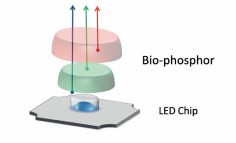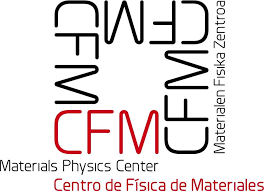The Project
The EU priority action lines state the need of advancing White Light-Emitting Diodes (WLED) replacing color filters with Inorganic Phosphors (IP: rare-earth elements and Cd quantum dot) for non-toxic and sustainable Organic Phosphors (OP).
ARTIBLED is inspired by highly efficient Bio-WLEDs based on Fluorescent Proteins (FPs), which are stable over weeks and beyond the state-of-the-art OP-WLEDs. However, the stability is limited by the intrinsic photodeactivation of FPs since natural chromophores were not matured by Nature to stand high photon flux excitations. Thus, there is an imperative need to enforce the evolution of photostable FPs directly prepared in bacteria. ARTIBLED proposes a radically new approach to prepare low-cost, highly efficient, and stable Bio-WLEDs by developing new biological synthesis tools to produce novel Artificial Fluorescent Proteins (AFPs) in bacteria, which will be achieved by combining tailored natural as well as de novo protein scaffolds with synthetic LED emitters (PLQY>50% with high photostabilities).

Thus, the novel Bio-WLEDs will also overcome previous limitations connected to photo-deactivation of natural chromophores. ARTIBLED aims to reach TRL4 for both AFP synthesis and Bio-WLEDs to fully meet the lighting needs at the forefront of the EU technology scenario by the end of the project.
News & Events

Quo Vadis Biogenic Phosphors?
La revista LED professional publica un artículo sobre los objetivos del proyecto ARTIBLED en su edición de Diciembre (página 64). LED professional publicará también los

LEDs de producción bacteriana
Este artículo de Wiley Analytical Science explica la estrategia de investigación con la que se lleva a cabo el proyecto ARTIBLED.

Proteínas fluorescentes artificiales para la siguiente generación de LEDs sostenibles y saludables
¿Qué pasaría si una bacteria pudiera producir el material clave para conseguir LEDs más baratos, saludables y sostenibles? Los LEDs se componen de un chip
Publications
ARTICLES IN PEER-REVIEWED JOURNALS
- A. Espasa, M. Lang, C. F. Aguiño, D. Sanchez de Alcazar, J. P. Fernández-Blázquez, U. Sonnewald, A. L. Cortajarena, P. B. Coto, R. D. Costa. Long-living and highly efficient bio-hybrid light-emitting diodes with zero-thermal-quenching biophosphors. Nature Communications 879 (2020) DOI: https://doi.org/10.1038/s41467-020-14559-8
- V. Fernández-Luna, J. P. Fernández-Blázquez, M. A. Monclús, F. J. Rojo, R. Daza, D. Sánxhez-deAlcazar, A. L. Cortajarena, R. D. Costa. Biogenic fluorescent protein-silk fibroin phosphors for high performing light-emitting diodes. Materials Horizons 7 (2020) DOI: https://doi.org/10.1039/D0MH00503G
- A. Aires, V. Fernández-Luna, J. Fernández-Cestau, R. D. Costa, A. L. Cortajarena. White-emitting Protein-Metal Nanocluster Phosphors for Highly Performing Biohybrid Light-Emitting Diodes. Nano Letters 20 (2020) DOI: https://doi.org/10.1021/acs.nanolett.0c00324
C. Barolo, A. L. Cortajrena, R. D. Costa, P. B. Coto, G. Ghersi, G. Oberdorfer. LEDs aus bakterieller Produktion. GIT Labor-Fachzeitschrift / Wiley Analytical Science (2020) https://analyticalscience.wiley.com/do/10.1002/was.000400057
C. Barolo, A. L. Cortajrena, R. D. Costa, P. B. Coto, G. Ghersi, G. Oberdorfer. Quo Vadis Biogenic Phosphors?. LED professional (2020) https://www.led-professional.com/downloads/lpr82_full_812522
Partners

The Technical University of Munich (TUM, project coordinator) has a unique profile with its core domains natural sciences, engineering, life sciences, and medicine. The institutional strategy is focused on strengthening the excellence of disciplinary core competences in research, teaching and learning, but is also targeted towards the promotion of ground-breaking and interdisciplinary research. TUM is committed towards the major challenges facing society in the 21st century in areas, such as energy, climate and environment, natural resources, health and nutrition, communication and information, mobility, and infrastructure. Besides research and teaching, TUM inspires and pro-actively empowers its 42,700 students, academics, and alumni to think and act entrepreneurially. TUM is regularly among the best national performers in international rankings.
In 2017, TUM founded the Integrative Research Center “Campus Straubing for Biotechnology and Sustainability (TUMCS)”, conducting fundamental research and technological developments on biogenic resources, biotechnology, and bioeconomy. Research focuses on chemical and energetic use of biogenic resources and its economic aspects. In 2020 the Biogenic Functional Materials Lab, headed by Prof. Rubén Costa, is created at TUMCS and will be involved in this project. The goal of his group is to progress technologies fulfilling the “green photonics” concept. His research portfolio spans from the designing of biogenic materials, stabilization methods in polymer matrices, and their use in energy related (lighting and photovoltaics) and medical (sensing and therapy) applications.

CIC biomaGUNE is a non-profit research organisation created in 2006 by the Basque Government to promote scientific research and technological
innovation related to biomaterials. The Centre comprises 12 international research teams conducting high-level research at the interface between chemistry, physics and biology, with particular emphasis on the properties and applications of molecular-level biological nanostructures. CIC biomaGUNE main research lines lie within the design, preparation and characterization of biofunctional nanostructures and their applications.
The Biomolecular Nanotechnology group (created in 2016) is the unit involved from CIC biomaGUNE. This group is led by Dr. Aitziber L. Cortajarena and
focuses on protein engineering toward the generation of functional nanostructures and bioinspired materials for applications in nanotechnology and nanomedicine. In detail, the group current research encompasses four main lines: i) proteins to template nanomaterials, ii) engineered proteins for biomolecular electronics, and iii) designed proteins to stabilized nanomaterials: imaging, sensing and catalysis iv) biofunctional structures for applications in nanomedicine. As such, they have a mature expertise going from the protein engineering, synthesis and characterization and the generation of protein-based hybrid structures and materials.

The University of Torino(UNITO)is one of the largest Italian Universities, with about 70000 students, 3900 employees (academic, administrative and technical staff), 1800 post-graduate and post-doctoral research fellows. Research and training are performed in 27 Departments, encompassing all scientific disciplines. UNITO is ranked in the top three Italian universities in nine scientific areas out of 16. In particular, UNITO is ranked in the first position in the following areas: chemical sciences, biological sciences, historical, philosophical and pedagogical sciences. UNITO is deeply involved in scientific research and manages roughly 500 projects per year, both at national and international level.
The Functional Organic Material Group, belonging to the NIS Interdepartmental Centre and the Department of Chemistry (established in 2012, with a staff of about 250 people (professors, researchers, technicians and administrative staff), coordinated by Prof. Claudia Barolo, is the unit participating from The University of Turin. The group has a long history in design and synthesis of organic and hybrid chromogenic systems for optoelectronic applications.

Abiel s.r.l. is a biotechnology Italian SME established in 2010 as a spin-off of the National Council of Research (C.N.R.) and the University of Palermo, with the partnership of Miami Diabetes Research Institute. The company is committed to R&D, production and commercialization of high quality lytic enzymes for regenerative medicine and cell therapy applications.
Abiel has developed a key technology platform patenting a highly performant production process of recombinant proteins, synthesizing innovative recombinant collagenases in E.coli. Recombinant collagenases represent an innovative tool for advanced therapies, and they show innovative properties in terms of stability, reproducibility and purity. As tissue dissociation enzymes, they allow to settle efficient, customized and standardized cell extraction procedures (stem/primary cells and pancreatic islets). Abiel commercializes its enzymes worldwide for regenerative medicine and cell therapy research and is keen to extend its market to clinical applications with GMP grade products.

The Graz University of Technology (TU GRAZ) is a publicly funded nonprofit independent research institute founded in 1811 and the oldest University of Technology within Austria. The TU Graz has divided its research into five innovate areas – these five fields of expertise include (i) Sustainable Systems; (ii) Advanced Materials Science; (iii) Human and Biotechnology; (iv) Information, Communication and Computing and (v) Mobility and Production. In addition to committing to the five fields of expertise, the main goals for research at the TU Graz are to break new grounds in basic research, foster interdisciplinary and international collaborations, to gain support for outstanding projects and to develop key technologies for industry and commerce. The TU Graz holds a well-established international reputation in these areas and has established a collaborative network with six renowned universities in these fields.
The Protein Design Group is the unit participating from TU GRAZ. It is part of the Institute of Biochemistry and was established in February 2018 at TU Graz. The group is led by Dr. Gustav Oberdorfer. The goal of Dr. Oberdorfer’s group is to further develop technologies for the functionalization of synthetic proteins. Specifically, his research if focused on i) the design of barrel-like protein structures to use them in biotechnology and biomedicine and ii) develop novel tools for the computational design of artificial protein scaffolds with ultra-high thermodynamic stabilities. As such, he has outstanding expertise in the de novo design of protein structures as well as their subsequent characterization (gene-synthesis, protein production, biochemical, biophysical and structural characterization).

The Spanish National Research Council (CSIC) is the largest public institution devoted to research in Spain and the third largest in Europe. It has a staff of more than 10 000 employees. Currently, CSIC has 120 institutes spread across Spain. Within CSIC, the Centre for Materials Physics in Donostia / San Sebastián (CFM-CSIC) is the instutute involved from CSIC. The CFM center is mainly devoted to the study of experimental and theoretical condensed matter physics, focused on the description of the electronic, magnetic, optical, and vibrational properties of nanostructures, biomolecules, surfaces, and solids.
The Theoretical and Computational Chemistry Group at CFM-CSIC is the unit participating from CSIC. Dr. Pedro B. Coto will be the principal investigator from CFM-CSIC. The main tasks of CFM-CSIC will be: performing theoretical studies of bio-conjugated AFPs, refining of the LED emitters with respect to the best molecular and electronic structure and the spectroscopic properties; and supporting the studies about AFP-polymer interactions and the degradation mechanism of the LED emitters.

IMDEA Materials Institute (IMDEA) is a non-profit independent research institute promoted by the Madrid regional government in 2007 to perform research in Materials Science and Engineering. IMDEA is committed to three main goals: i) excellence in Materials Science and Engineering research; ii) technology transfer to industry to increase competitiveness and maintain technological leadership; and iii) attraction of talented researchers from all over the world to Madrid to work in an international and interdisciplinary environment.
The Project Management Office (PMO) at IMDEA will carry out the administrative coordination of the project.
Funded by
This project has received funding from the European Union’s Horizon 2020 research and innovation programme under grant agreement No 863170


